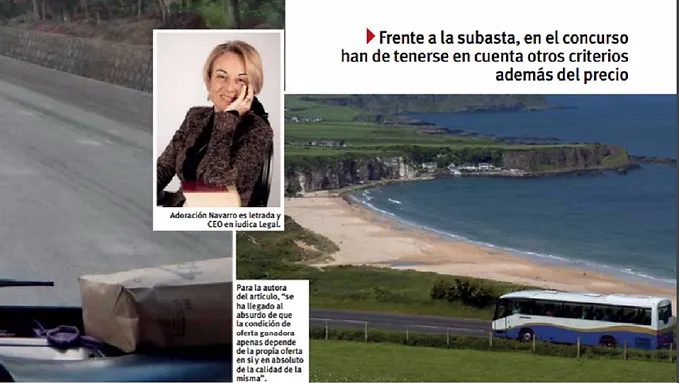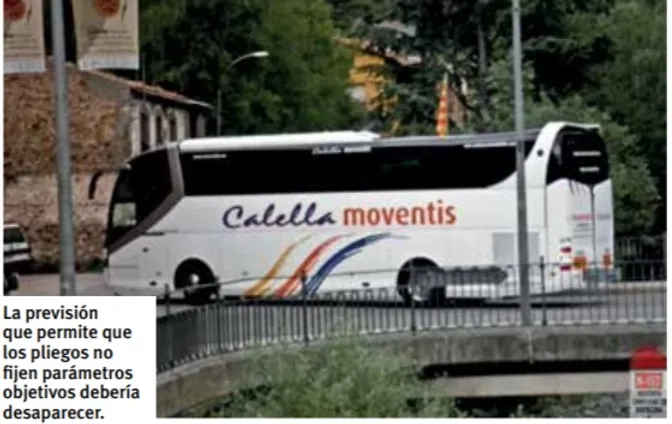Contests, reckless casualties and the lottery
16/10/2017
Share
Perhaps because I come from the world of justice and the courts – and that marks – and perhaps because, compared to most of you, I am very new to the sector, I see very clearly the need for a profound reform and modernization of the management of the contests for the awarding of concessional services, which, at the same time, provide ethics, absolute respect for legality, transparency and free and healthy competition.
And here I find myself, playing “Jiminy Cricket” because I find myself “eye-watering” with the awards in the contests for the regular services – the permanent ones for general use, you know -: they are the closest thing to the lottery, and that thing called objectivity It is nothing but a dream and discretion is reality. So much so, that the absurdity has been reached that the condition of winning offer barely depends on the offer itself – and not at all on its quality – and depends only on the exclusions that occur as a consequence of the average rate reductions due to the application of article 85 of the General Regulations of the Public Administration Contracts Law (RCAP); And not only that, to win any of these contests you not only have to be in a reckless withdrawal, but in a very reckless withdrawal – which has reached 48% -.
As a starting point we must know that both the auction and the competition constitute public contracting processes, with a substantial difference between the two resulting in that, while in the auction, in this case the public service is awarded to the proposal that presents the lowest price. -the only award criterion is the price-, in the competition, in addition to the price, other criteria must be taken into account, in such a way that the contract must be awarded to the proposal that is most advantageous, not necessarily the most economical. . The specifications of the tenders we are talking about, in clause 3.4, section 2.1 – tariff assessment criteria – makes a general reference to the criteria provided in the regulations governing public sector contracting to determine the offers with abnormal or disproportionate values, and, in particular, article 85 of the RCAP. The aforementioned little article – sorry, a pain if there is one – establishes the criteria to determine when offers – in public auctions – are disproportionate or reckless. Since I don’t want to give you the tostón with legal precepts and this one is especially dense, I will summarize its contents; In principle, it considers disproportionate or reckless withdrawals depending on the number of bidders: one bidder, lower bidding base by 25 percentage units; two bidders, 20 units; three bidders, in general, lower by more than 10 units than the arithmetic mean of the offers presented and whenever it is lower by more than 25 units; four or more bidders, same initial criteria as the previous one, with limitations.
Rate reduction
Although other criteria other than the purely economic ones are scored in the tenders, in the end it turns out that the rate reduction is the determining factor for their award. But not such a reduction, but rather, when article 85 is applied, it is completely unknown what this is, as it depends on the averages resulting from the rates presented and the exclusions that arise from the consideration, with such criteria, as a reduction. reckless Therefore, depending on extraneous factors, it may result – and in fact it does – that offers are admitted and tenders are awarded to completely reckless offers and even to offers that cannot but be classified as very reckless – even approaching a low 50% – in accordance with the requirements of the respective specifications. And totally unfeasible -if the data in the specifications are correct, of course-, given that there can be little variation in the costs -workers, fuel,…- that the provision of the service entails for the different companies and increase the number of travelers in the proportions that are offered are absolutely impossible; Additionally, as stated by the courts and the TACRC, it is not possible to value contracts with other companies or optimize resources due to prior implementation in an area or belonging to a group of companies as any of them constitute anti-competitive advantages.

Thus, in tenders with similar characteristics, the Administration, in some cases, is rejecting lower offers because it considers them reckless – without taking into account the companies’ justifications – and in others, with higher reduction percentages, they turn out to be the winning proposals. In practice, by giving little importance to technical proposals and the economic criterion being preponderant and determining, there is no difference between contracting by public entities via auction or via competition: although entry is given, in the latter case, due to the absence of uniform objective criteria in the acceptance/rejection of reckless casualties, to a dangerous discretion. The crux of the matter is not in presenting a quality offer in the broadest sense of the word, it is in not being excluded from the competition for economic reasons, even if the offer is notoriously disproportionate and very reckless. And this is impossible to know a priori, given that there are no established, clear, common and uniform criteria. That is to say, we are immersed in continuous and frontal violation of the principle of legal certainty guaranteed in article 9.3 of the Spanish Constitution.
Objective parameters
And, at this point, why doesn’t the Administration establish objective parameters in the specifications that serve the purpose of determining whether or not a proposition can be fulfilled as a consequence of the inclusion of abnormal or disproportionate values? This is clearly permitted by article 152.2 of the TRLCSP, as these are contests in which, for the award of the service, more than one assessment criterion is weighed. Furthermore, according to the last paragraph of this provision, if the price offered is one of the objective criteria that must serve as the basis for the award, the limits may be indicated in the specifications that allow it to be appreciated, where appropriate, that the proposal cannot be fulfilled as a consequence of disproportionate or abnormal offers. And at this point, why is the content of the Opinion of the Council of State of March 10, 2016 on the Preliminary Draft of this Law ignored? Transcribing literally “it is worth highlighting the requirement that objective parameters be established in the specifications that allow identifying cases in which an offer can be considered abnormal. The purpose of providing for the aforementioned requirement is to guarantee the effectiveness of the essential principles of public procurement, to avoid arbitrary application of the “abnormality thresholds” and to enable the correct articulation of the procedure. The Council considers it appropriate to articulate a regulation that, on the one hand, allows checking whether or not an offer is abnormally low both through comparison with others in the phase of reception and analysis of all offers and, on the other hand, through the inclusion as requirement in all specifications, allows objective assessment – without the need for said comparison – of the economic sufficiency of the offer to meet the cost of the work or service to be executed. In effect, this would avoid the situation that occurs on some occasions in which the assessment of abnormally low offers cannot be determined by comparing them with others – because these also participate in said character, either accidentally or as a result of concerted practices -, although it is clear from their terms that they are economically insufficient to meet the satisfaction of the direct costs of the work or service. This circumstance subsequently results in the failure of the successful bidder to comply with the contractual provisions and the consequent damage to the public interest. It is therefore desirable that, without prejudice to the observance of the competition rules, the Administration has some instrument that allows it to exclude offers that, objectively being abnormally low and insufficient to ensure compliance with the service, nevertheless cannot be qualified as such through the ordinary mechanism of comparison with others. Thus, it is considered that the provision that allows the specifications not to set objective parameters should disappear, always having to establish them and through this allow the independent qualification of the offers.

Legal certainty
What is the problem that legal certainty cannot be provided to regular service contests? Why don’t we give a little shine and splendor to the poor article 74.4 of the Land Transport Management Law (LOTT) – disproportionate or abnormal conditions, technically inadequate or that do not properly guarantee the continuity of the service or his provision under the precise conditions -, that he must walk around like a soul in pain in the face of the continuous beatings he is suffering? An offer should not be considered reckless or not in relative terms and by comparison with the average of those presented, but in absolute terms – application of article 152.2 of the TRLCSP instead of article 85 of the RDAP -, for its goodness, for its quality , and of course, for its economic cost – with prior establishment by the Administration of a balance rate/base, an objective parameter, consistent with the Official Cost Observatory, which determines the line from which any offer will be undoubtedly considered. as reckless. Furthermore, the Minister of Public Works, in the last FIAA, declared that reckless withdrawals from tenders would not be admitted; In this same line and with that same purpose, in the very recent Summer Course held in September in Santander -organized by Confebús-, a reform of the specifications was announced to increase the technical assessment up to 45-55% of the economic proposal-, and to reduce the admissible amount below the average of the offers presented from the current 10% to 8%. Of course, the “small” problem is that, when the aforementioned article 85 of the RCAP is applied, the 8 is the same as the 10, given that no objective limit is applied since the rating as reckless depends on a comparison with the average of the offers. And the same can be said in relation to the increase in the valuation of the technical offer. Therefore, a very sound ministerial interest could be ruined in practice if no objective limit continues to be applied. (I repeat myself, I know, when quoting Lampedusa and his “something needs to change so that everything remains the same”). In another line of reasoning, if we start from the acceptance of cancellations such as those already mentioned and that bids that can be classified as very reckless may result in winners of competitions, it seems a logical conclusion to think that the Administration assumes that the data of its Project is not correct: and This is not pretty, especially if we take into account that such data constitutes the reference for all offers, the serious ones and those that are not so serious. But a situation like the present one also affects the overall economic profitability of an already severely punished sector and the salary and social conditions of workers, fostering a climate of conflict. And if we add to this that the order of opening tenders according to the expiration date of the services is not being respected and that resolutions that annul the awards made by the Administration are continuous, the panorama of uncertainty and legal uncertainty is overwhelming. In view of everything that has been said, it seems that we are dangerously approaching the terrain of the most absolute discretion, also prohibited in the Constitution itself -article 9.3-. I think you can name the next step… And, if so, should we keep rolling the hype? You have the answer. And perhaps the transport employers too.

